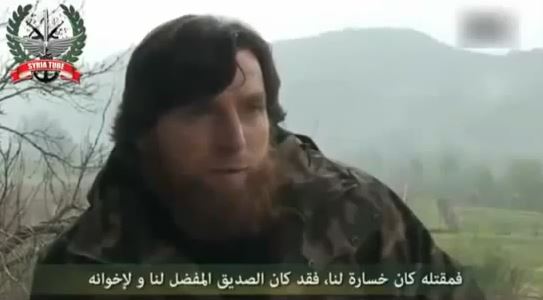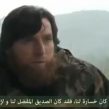
Russian Muslim Militants Are Joining the Ranks of Rebel Fighters in Syria
Publication: Eurasia Daily Monitor Volume: 10 Issue: 117
By:

Throughout 2012, Russian leaders refused to admit that there were any Chechens fighting on the side of the Syrian opposition. Ramzan Kadyrov tirelessly reassured the public that reports of Chechens being involved in the armed conflict in Syria were false (https://rusnovosti.ru/news/214102/). Kadyrov was apparently concerned about Chechens being implicated in siding with the Syrian opposition against Russia’s ally, Bashar al-Assad (https://sp-analytic.ru/news_cut/1713-soyuz-nerushimyy-respublik-svobodnyh-protiv-bashara-asada.html). Pretending there were no Chechens fighting in Syria was becoming increasingly untenable given that video reports about successful operations by Chechens in Syria were being posted to online websites on a weekly basis (www.youtube.com/watch?feature=player_embedded&v=Eq9eT4npTDo#!).
Ramzan Kadyrov was recently forced to admit that Chechens have been involved in the war against al-Assad’s regime (https://rusnovosti.ru/news/267134/). In order to provide at least some justification for his previous erroneous denials, Kadyrov put the blame on the Western security services. “The internal conflict in Syria is not a ‘holy war,’ it is an action planned by external forces to overthrow the government,” Kadyrov insisted (www.aif.ru/society/news/389937). Judging by how he is received in the Arab Middle East, the Chechen leader still thinks the Arab world regards Russia with sympathy (https://www.interfax.ru/txt.asp?id=312547&sec=1483&utm_source=twitterfeed&utm_medium=twitter). This perception, however, does not correspond with reality, to put it mildly. Having taken sides with the minority that Bashar al-Assad is associated with, Russia has put itself at loggerheads not only with the Sunni majority in Syria, but also the whole Sunni world, which comprises an absolute majority of the Islamic world.
Kadyrov’s words are entirely in accordance with statements that the Grand Mufti of the Syrian regime, Ahmad Badreddin Hassoun, made in an interview with Russian news agencies (www.interfax-religion.ru/?act=interview&div=377). Hassoun’s interview with the Russian news agency Interfax was reportedly edited in Moscow for an entire day, and the issue of Chechnya as a source of anti-Assad forces was reportedly cut from the final version of the interview (www.islamnews.ru/news-140206.html).
The Syrian Grand Mufti dropped a few important facts from his account. For example, singling out Chechens as participants in the Syrian conflict is misleading, given that, besides Chechens, there are also Dagestanis, Circassians, Balkars, Karachays, Crimean Tatars and Volga region Tatars fighting in Syria.
Information about the involvement of Crimean Tatars in the Syrian conflict started to emerge with news reports about deaths of residents of Crimea and Ukraine in Syria (https://uainfo.org/blogosphere/journalists/130876–rymskie-tatary-gotovyatsya-k-voyne-panorama-aterina-rizanchuk.html). One video, for example, asserted that Emir Abdulkarim of the Crimean Tatar jamaat was wounded near Aleppo (https://fisyria.com/?p=477). Notably, Tatars in Ukraine do not hide their sympathies for the militants fighting Assad. In another video, Imam Elvin of the mosque in Alushta, Crimea, speaks in favor of helping those fighting Bashar al-Assad’s forces (www.youtube.com/watch?v=CMmXv3UKxvQ). The imam claims that back in the seventh century, the Prophet Muhammad prophesied about a battle in Syria, and therefore the war in Syria is holy and participation in it is the sacred duty of all Muslims. In the city of Bakhchisaray in Crimea, Muslims held a rally in support of Syria’s opposition under the slogan “One Umma, One Flag, One War” (www.youtube.com/watch?v=_I79qb0MDK8).
In a new development, Tatars from the Volga region are also reportedly participating in the war in Syria. In 2012, jihadists seriously strengthened their positions in Tatarstan (www.youtube.com/watch?v=BH0_CVDy8oQ). Russian experts have also been forced to admit that the Volga region Tatars are involved in the Syrian conflict – in particular, members of the so-called Bulgar jamaat led by Airat Vakhitov and Salman Bulgarsky of Tatarstan (https://celiy-mir.ru/?p=430). According to Russian analysts, up to 250 militants from Russia are fighting in Syria, even including ethnic Ossetians. Radicalization of the once peaceful Ossetian youth, specifically among the Muslim-Digors, shows how swiftly the situation can change in the North Caucasus. This is not the first time that Ossetians have been detected among the radicals in the Middle East (www.segodnia.ru/content/118129), and the involvement of Dagestanis and other North Caucasians among the radicals in the Middle East is no longer news: indeed, multiple videos have been posted on YouTube. The only recent development has been that the militants in the videos have started identifying themselves as representatives of the Caucasus Emirate (https://www.youtube.com/watch?v=jzTdTmsoQJM).
It should be noted that all figures regarding Russian militants fighting in Syria are highly unreliable. For example, as of May 2013, it was estimated that 16 Russian citizens had been killed in the fighting in Syria (www.inosmi.ru/overview/20130611/209929254.html). However, in reality, according to the author’s own calculations and monitoring of the conflict, twice as many ethnic Chechens have been killed in Syria in this period than what Russian authorities claim, which indicates that Moscow is deliberately concealing how many Chechens are leaving to join the ranks of the rebels in Syria.
Thus, whoever failed to receive military experience in Chechnya in the 1990s or at the start of the 2000s is now being given a unique opportunity by Putin to do so today in Syria. All those who survive this war will likely return to Russia in order to remake it according to their vision. Those people who fight in Syria will come to be seen by fighters inside Chechnya as “higher-end” jihadists in comparison to those who remained in the North Caucasus. This, in turn, will cause discord between the two groups, although aversion toward Russia will help them to join forces to damage Russian interests both inside and outside the country. Once this is achieved it will make former Arab fighters like Emir Ibn al-Khattab—who fought in Chechnya in the 1990s and were revered by militants there because of their financial and political ties to the Middle East—irrelevant because those Chechens who went to Syria to fight will now have similar contacts and ties to radical groups in the Middle East, which until now would have been unprecedented for militant fighters from the North Caucasus.
Therefore the growing involvement of Russian Muslims in the Syrian civil war will have an impact on Russia, and there are people who see it as a great danger to the future of the country (https://flnka.ru/aktualnoe/print:page,1,2021-voyna-v-sirii-rasshatyvaet-kavkaz.html). Even now, the North Caucasus is no longer the only part of Russia that has experienced a proliferation of jihadist ideas: such ideas have now spread to the Volga region and central Russia, including Moscow and St. Petersburg. These developments indicate that Moscow is increasingly being drawn into fighting Islamic forces—a fight that it has evidently been losing since 1991.




